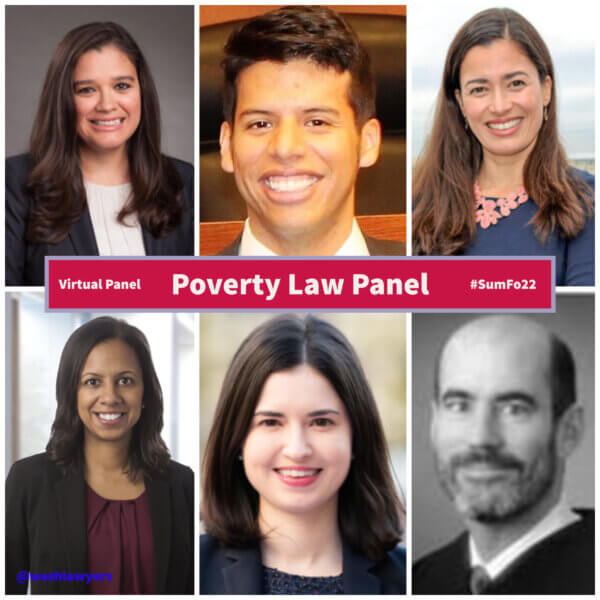
2022 Summer Forum: Helping Individuals and Families In Need
By Kelly Panquali
In our second panel discussion, we explored the variety of legal needs of low and moderate-income families in DC and across the country. We were joined by
- Sébastien Monzón Rueda from Legal Counsel for the Elderly
- Ashley Carter from the DC Volunteer Lawyers Project
- Harmony Jones from Steptoe & Johnson
- Tracy Goodman from the Children’s Law Center
- the Honorable John McCabe from the D.C Superior Court
Debbie Cuevas Hill also with Legal Counsel for the Elderly facilitated our discussion. The conversation centered around the need for volunteers in special education, health inequity, and housing. Our panelists particularly emphasized the need for pro bono lawyers to help enforce clients’ rights and help clients navigate the often difficult and complex legal system. They also shared how they view their work through a racial equity lens.
The need for pro bono assistance has increased during the pandemic and the resulting legal fallout. Due to the high demand for legal services, organizations had to turn clients away as they reached capacity. That left thousands of individuals and families without legal assistance at a most critical time. The panelists explored a few areas of particular need and explained what law students and pro bono lawyers could do to make a difference for their neighbors.
One area of great need is in the housing context. Harmony, through the law firm pro bono projects she manages, and Sébastien through his work with Legal Counsel for the Elderly has seen the rise in the need for tenants’ know-your-rights clinics and representation in court. They elaborated on the fact that over 90% of tenants are not represented by legal counsel whereas over 90% of landlords have counsel. For example, the assistance of pro bono lawyers can mean the difference between family stability and homelessness. The effect of legal representation on a positive outcome in these cases can not be overstated.
Tracey and Ashley emphasized the importance of pro bono volunteers in their work. As they discussed, pro bono volunteers are key partners in their ability to provide effective representation to their clients, pursue systemic advocacy, and work toward closing the justice gap. And, all our panelists agreed that the path of a public-interest lawyer is not always linear. The skills you develop, the connections you make, and the experiences you gain through volunteering can be the building blocks of a long and satisfying career.
The Honorable John McCabe gave some closing remarks. While echoing the sentiments of our panelists, he also reminded us that courts want to see pro bono lawyers helping litigants. Judges want to encourage and support pro bono where they can, so you should not be afraid to take on a case, even if it’s not in a familiar practice area. The legal system can only be helped by competent representation on both sides of a case, particularly in the high-volume courts.
Our experts concluded the conversation with advice to law students and new advocates. Seek out pro bono opportunities when you can. As a summer associate, your law firm’s pro bono coordinators can help you find a case that interests you. Law schools have pro bono coordinators who can connect you with the work that can help you develop skills while giving back to your community. With virtual representation continuing for some time, volunteers can help from anywhere. Lastly, they cautioned to never limit yourselves and to take advantage of every opportunity while maintaining the connections of those who mentor and aid you along the way.
Additional Resources:
https://www.dcvlp.org/volunteer/
https://www.aarp.org/volunteer/programs/lce/
https://www.dccourts.gov/pro-bono-sc
Kelly Panlaqui is our 2022 Summer Intern.






